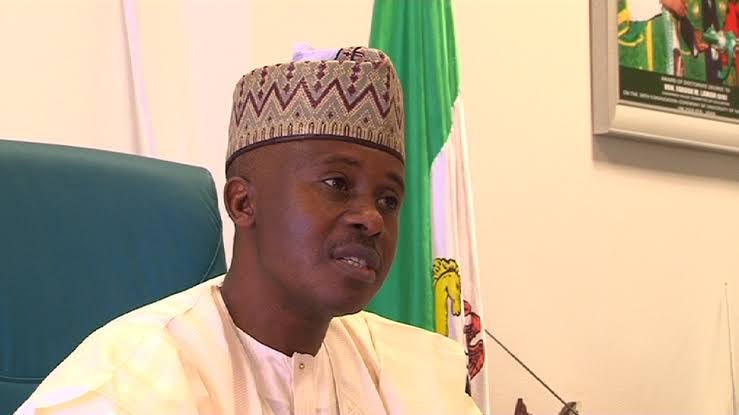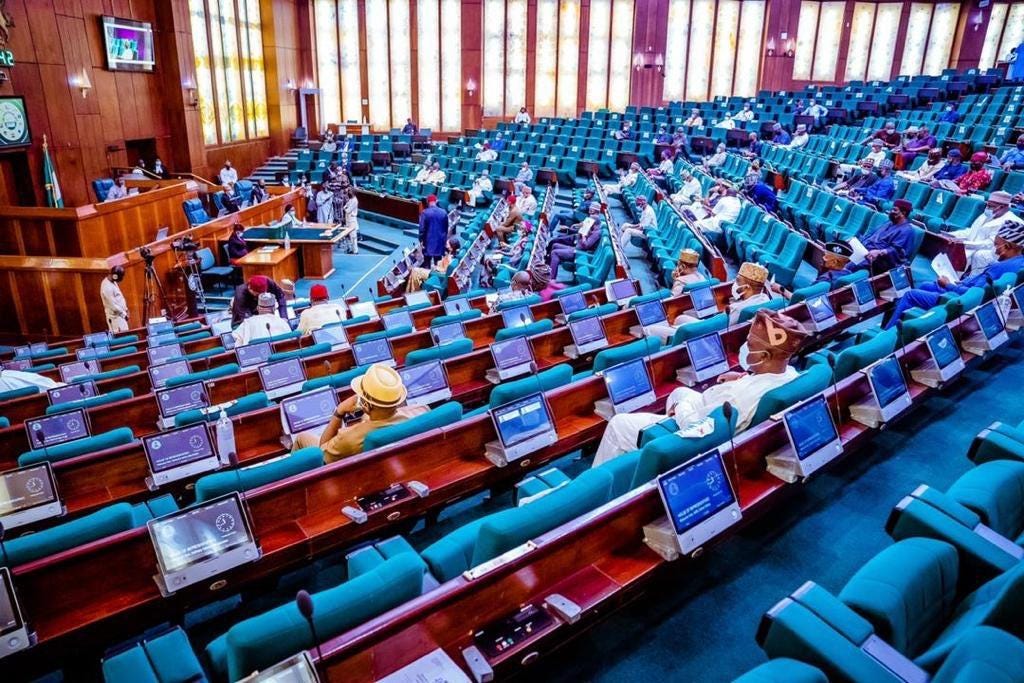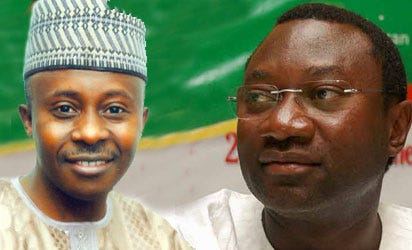Otedola And The Magic Pen
A Forensic Story of Nigerian Bribery and Corruption
1. Farouk Lawan: The Chosen One
Farouk Lawan
Honourable Farouk Muhammed Lawan was the chosen one. The Nigerian House of Representatives was determined to get to the root of the corruption in the administration of fuel subsidy in the country, and Lawan would lead the vanguard; he would serve as the Chairman of the House Ad-Hoc Committee set up “To Verify And Determine The Actual Subsidy Requirements And Monitor The Implementation of The Subsidy Regime In Nigeria”. This most-important Committee was established in an emergency session of the House on the 8th of January 2012, under Resolution No. HR.1/2012.
In a sense, Lawan had been prepared to steer a delegation on such a sensitive national issue his entire life. Born in Shanono, the eponymous village and headquarters of Shanono Local Government, Kano State, on the 6th of July 1962, Lawan was no stranger to the dirty skirmishes of politics, perhaps he even savoured it. After graduating from Bayero University, Kano State, with a Bachelors’ and a Masters’ Degree in English, alongside a Postgraduate Diploma in Management, Lawan worked as a registrar of the Kano State Polytechnic. Yet, Lawan’s first official foray into politics came in 1992 when he served as the Chairman of the Social Democratic Party (SDP) in Shanono Local Government, Kano State. In 1999, Lawan was elected to represent the Bagwai/Shanono Federal Constituency at the Federal House of Representatives under the platform of the Peoples Democratic Party (PDP). He was re-elected to the same seat in the 2003, 2007 and 2011 general elections.
Of an indubitable fact was that Lawan was a good politician, a really adept one. Political insiders confirm that Lawan was a “key factor” in the emergence of at least five Speakers of the House of Representatives: Salisu Buhari, Ghali Na’abba, Aminu Masari, Dimeji Bankole, Aminu Tambuwal and Olubunmi Patricia Etteh—Nigeria’s first female Speaker.
At the rising of his political influence in 2007, Lawan led a caucus within the House called the “Integrity Group”; this group spearheaded the campaign against Etteh over allegations that she violated House Rules by awarding contracts of up to ₦628 million for the renovation of her official residence and that of her deputy, Babangida Nguroje, including the purchase of 12 cars, allegations which eventually led to the resignation of Etteh and her deputy.
In recognition of his stellar public service record against public corruption and injustice, Lawan’s colleagues gave him the nickname “Mr Integrity”. And that was just the least of it, because in the fierce dispatch of his legislative duty, silent whispers along the corridors of power began to swirl that Lawan could emerge as the governor of his home Kano State someday. I mean, the man had all it took.
Read: Section 52(2): “Transmission, Transmission, Transmission”
2. The Emergency Session
A session of The Nigerian House of Representatives (‘The Green Chamber”)
Let’s leave Farouk Lawan for a moment and beam our searchlight on the matter that brought him to national reckoning: fuel subsidy.
On the 2nd of January 2012, Nigeria began boiling. This boil was akin to the sixth plague that the Abrahamic God poured out on the Egyptians through Moses and Aaron for not letting his people go. The only difference here was that, this time, the man that was taking Nigerians to an inconsiderate boiling point was its very own president, Goodluck Ebele Jonathan. Just a day earlier, on the first of January 2012, Jonathan had effected the removal of fuel subsidy on premium motor spirit, or petrol, across Nigeria. In a statement realeased by the agency regulating petrol price in Nigeria, the Petroleum Product Regulatory Agency (PPPRA), issued through its Executive Secretary, Reginald Stanley, the agency stated that “by this announcement…petrol product product marketers are to note that no one will be paid subsidy on PMS discharges after 1st January 2012”.
Once did Mr. Stanley speak, but twice did the streets hear: the price of petrol in filling stations across Nigeria immediately jacked up from ₦65 to at least ₦141 naira no thanks to PPPRA’s corrosive statement. In the heat that followed, acephalous protests spearheaded from Ojota, Lagos sprung up throughout Nigeria from January 2, 2012 in response to the government’s arbitrary directive, in what is now known as the “Occupy Nigeria” protest. The protest continued for more than ten days at many centers around the world including at Nigeria’s High Commission in London and at the World Bank Complex in Washington D.C. with reverberating consequences, so much so that political observers called it a “wind of change” that was synonymous to The Arab Spring revolution of the Middle East and North Africa.
And yet, it was in the midst of this mass hysteria that the House of Representatives rose up. Nigeria had been paying fuel subsidies in some form since the 1970s and directly to “fuel marketers” since 2006, but no one really knew where all those huge monies went. Through the fall stroke of an Ad-Hoc committee, the House decided to investigate Nigeria’s actual fuel subsidy performance from 2009-2011. For this purpose, the House held its first ever emergency session on Sunday, 8th of January 2012; it also created the committee set up to verify, determine and monitor the implementation of the Subsidy Regime in Nigeria from 2009 to 2011. From there on, the House nominated Honourable Farouk Lawan as the committee’s chairman, alongside seven other members.
The Lawan-led ad-hoc committee held public hearings from 16th January, 2012 to 9th February, 2012, taking sworn testimonies of about 130 witnesses, poring through over 3,000 volumes of documents and interrogating more than 93 petrol marketing companies in Nigeria who received payment from the government as fuel subsidy for Nigerians.
The committe got back to the House with its report on the 18th of April 2012. But, in its search for the truth, did the committee reveal the truth and nothing but the truth on behalf of Nigerians? We shall soon find out.
Read: The Mask of Osimhen
3. Otedola, SSS And The Magic Pen
Inset: Farouk Lawan and Femi Otedola
“Honourable Farouk, is this recommendation coming from your committee?”, the Deputy Speaker of the House, Honourable Emeka Ihedioha, who was presiding over the plenary on the 21st of April 2012, asked Farouk Lawan, a question to which Lawan replied in the affirmative.
As it happened, Lawan, after presenting the 210-paged report of the Ad Hoc Committee, proposed on the floor of the House a few days later that the House should strike off the names of two companies from the list of companies indicted by the committee for receiving forex from the CBN but subsequently failing to bring in fuel and that the two companies did not participate in the subsidy programme. These companies were Synopsis Enterprises Limited and Zenon Petroleum and Gas Limited, the latter company owned by oil magnate, Femi Otedola.
And given Lawan’s public record of integrity, you would think that he had endorsed the striking off of Zenon Petroleum and Gas Ltd., Otedola’s company, due to a honest error on the part of his committee. But no, things soon took a sinister turn. On June 9th 2012, just two months after Lawan’s presentation on the floor of the House, Otedola burst a bubble: in an exclusive interview with ThisDay newspaper, he alleged that Lawan had demanded a $3 million bribe from him to exonerate Zenon Ltd. from the ad-hoc committee’s report.
Otedola stated in the interview that Lawan had approached him a few days before the report was to be tabled on April 18, 2012 before the House of Representatives, demanding money so that Zenon’s name will be kept out of the report.
“When this happened, I was very angry and reminded him that Zenon has never participated in the subsidy scheme and that it would be criminal to rope in the company for something it did not do.
Otedola then revealed that since Lawan would not budge, he decided to involve the security agencies to catch Lawan and his committee. According to him:
“As a law-abiding citizen, I decided to involve the security agencies and they advised me to play along, which prompted me to offer to pay part of the money with the promise that I would pay the balance when my company’s name had been removed from the report.”
In the interview, Otedola disclosed that the State Security Service (SSS) gave him serialised dollar bills of up to $500,000 for the sting job; the Service also gave him a pen recorder which he used the to record his discussions with Lawan and other top members of the House Committee involved in the bribe scandal.
The audio conversation over the $3 million bribery scandal eventually leaked with Lawan and Otedola confirming the initial payment of $620,000.
In a sworn witness statement given in court in November 2018 over the case, Otedola, when quizzed by the counsel to the Federal Government, Oluwagboyega Awomolo, further revealed that:
I could not have put him under pressure because Zenon Oil was not involved in the theft of subsidy funds…
If he did not demand (for money), why will he collect the $500,000 and was expecting $2.5 million. He did mention to me that the $3 million was going to be shared by himself and other officers of the house…
The company in question was not involved in the importation of petroleum motor spirit (PMS) and as such never applied to withdraw from the petroleum fund…
I did not offer any $3 million. I was one of the biggest players in the business and I reported the matter when I found out about the scam…
He did mention to me that several companies involved in the scam were paying and I reported to the DSS.
Postscript
In February 2022, the Court of Appeal in Abuja sentenced Farouk Lawan to five years imprisonment for receiving a $500,000 bribe while serving as the chairman of the House of Representatives’ ad-hoc committee investigating the fuel subsidy fraud in 2012. The Supreme Court further affirmed the decision of the Appeal Court in January 2024.
Recommended reading: End NYSC Already





